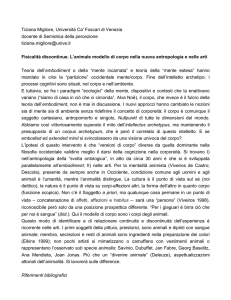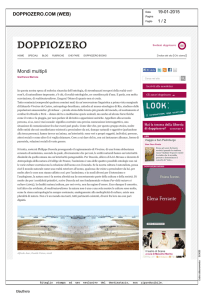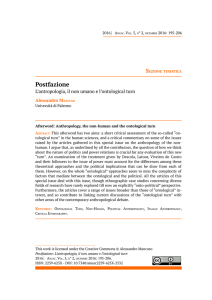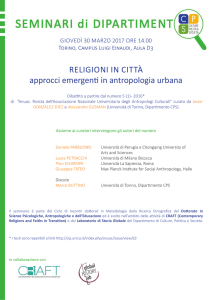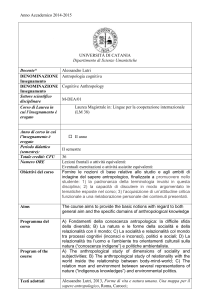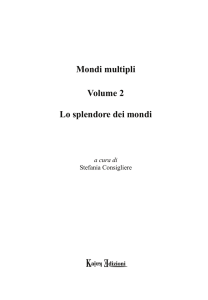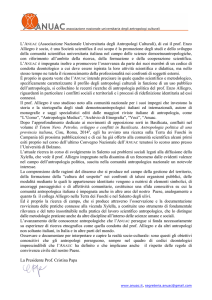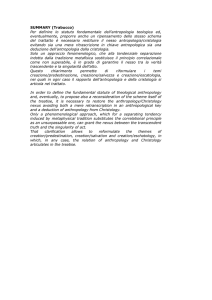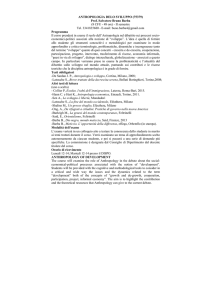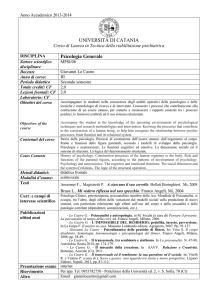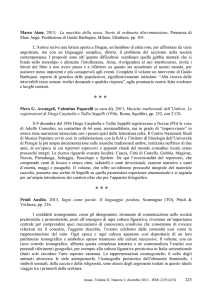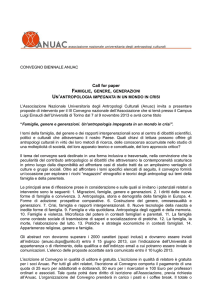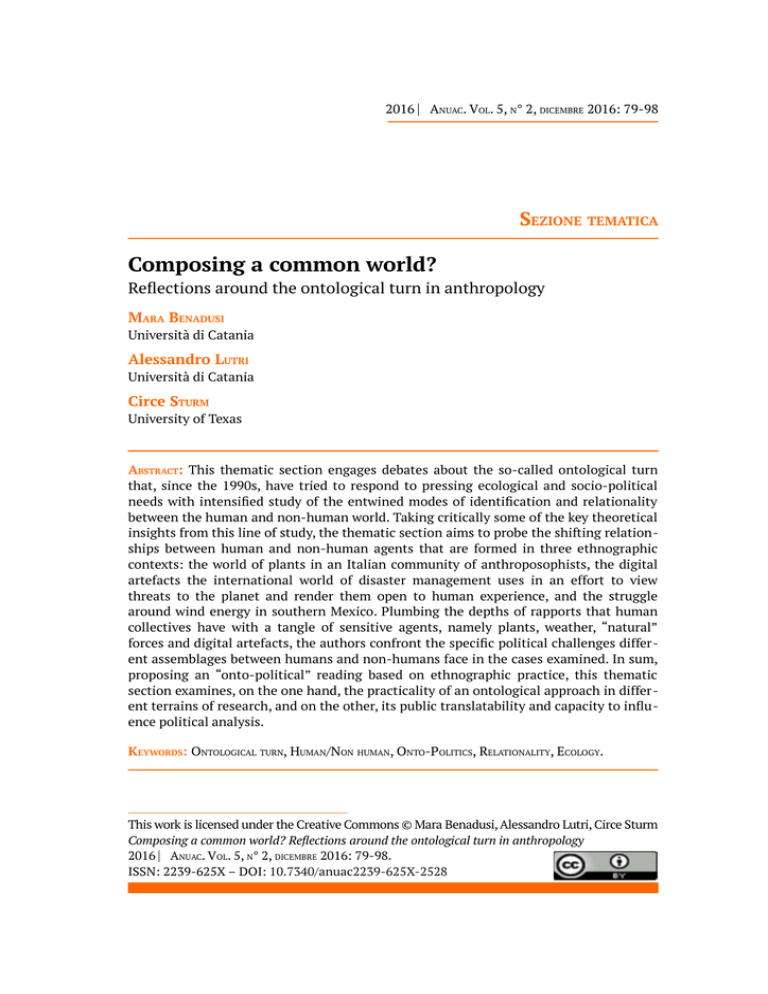
2016 ⎸ANUAC. VOL. 5, N° 2, DICEMBRE 2016: 79-98
SEZIONE TEMATICA
Composing a common world?
Reflections around the ontological turn in anthropology
MARA BENADUSI
Università di Catania
Alessandro LUTRI
Università di Catania
Circe STURM
University of Texas
ABSTRACT: This thematic section engages debates about the so-called ontological turn
that, since the 1990s, have tried to respond to pressing ecological and socio-political
needs with intensified study of the entwined modes of identification and relationality
between the human and non-human world. Taking critically some of the key theoretical
insights from this line of study, the thematic section aims to probe the shifting relationships between human and non-human agents that are formed in three ethnographic
contexts: the world of plants in an Italian community of anthroposophists, the digital
artefacts the international world of disaster management uses in an effort to view
threats to the planet and render them open to human experience, and the struggle
around wind energy in southern Mexico. Plumbing the depths of rapports that human
collectives have with a tangle of sensitive agents, namely plants, weather, “natural”
forces and digital artefacts, the authors confront the specific political challenges different assemblages between humans and non-humans face in the cases examined. In sum,
proposing an “onto-political” reading based on ethnographic practice, this thematic
section examines, on the one hand, the practicality of an ontological approach in different terrains of research, and on the other, its public translatability and capacity to influence political analysis.
KEYWORDS: ONTOLOGICAL TURN, HUMAN/NON HUMAN, ONTO-POLITICS, RELATIONALITY, ECOLOGY.
This work is licensed under the Creative Commons © Mara Benadusi, Alessandro Lutri, Circe Sturm
Composing a common world? Reflections around the ontological turn in anthropology
2016 ⎸ANUAC. VOL. 5, N° 2, DICEMBRE 2016: 79-98.
ISSN: 2239-625X – DOI: 10.7340/anuac2239-625X-2528
80
MARA BENADUSI, ALESSANDRO LUTRI, CIRCE STURM
Introduction
In recent years the anthropological debate around “how natives think,”
and “what it is possible to think,” with respect to the human and non-human
has been enriched by various contributions, both theoretical and ethnographic. The main thread that unites these works is the attempt to classify
different ways of identification and rapport that bind the human collective to
a non-human world which includes animals, plants, spiritual agencies, energy resources, modern technologies, to mention only some of the possibilities. This thematic section, Onto-politics: Rethinking the relations between humans and non-humans1, takes up this debate, a debate driven not only by cognitive needs, but also – as we will see – by ethical and political instances
born in response to the intensification of environmental crisis and “natural”
disasters in the world and the fresh outbreak of social inequality due to neoliberalism.
Up until the end of the late nineties of the 20 th Century, in the field of
anthropology there emerged various attempts to decolonize Western
modernist thought, the “anthropocentric” character of which was explained
as mediating between lasting and stubborn conceptual dualisms, such as
those between nature and culture, nature and society, subject and object.
Among the major protagonists of this debate are authors like Philippe
Descola, Bruno Latour, Eduardo Viveiros de Castro, each of whom in different
ways have proposed an enlargement of the anthropological gaze “beyond”
the cognitive boundaries related to the human world, identified in
epiphenomenal form with the cultural life of social groups distinct from each
other and unfailingly varied, a scope that classical anthropology tended to
associate with the study of “civilization.” Paying ethnographic attention to
“how natives think” about reality and again directing theoretical reflection
to the question of “how one can think or what it is possible to think”
substantially brings into question the constructivist and multiculturalist
perspective that characterized much of anthropology’s post-modern matrix.
1. The contributions published here were presented and discussed over the course of a work shop organized at the University of Catania by Alessandro Lutri and Mara Benadusi, at the
end of September 2015, that also saw the involvement of American colleague Circe Sturm in
the role of discussant. It was an important occasion of sharing, that allowed the authors to
dialogue about their areas of research without the restrictions of time that typically characterize academic conferences. And so this formed the basis for the construction of a collective
perspective that was then brought to the writing of this thematic section of Anuac. In addition to colleague that took part in this publication, we would like to thank Stefano Montes
for his contribution to the seminar.
2016 ⎸ANUAC. VOL. 5, N° 2, DICEMBRE 2016: 79-98
COMPOSING A COMMON WORLD?
81
However, the renewal of interest in the modes of identification and relation between humans and non-humans did not arise solely from the need to
overcome the theoretical impasse into which postmodernism had fallen: the
debate was also motivated by a desire to rethink the modality of ontological
frameworks by which modern metaphysics had historically conceived the
non-human world, imagining it as an objective realm, alien and autonomously comprised of a set of givens that were inherently opposed to the
fluctuating, subjective and ephemeral world of humans. As a result, anthropology has renewed its interest in human/non-human collectives, forged
thanks to the ongoing relationship between man and other global agents,
documenting ways of inhabiting the world where the ontological relationship between nature and culture takes shape not as dichotomies, but as cases
that are better defined as “substantialist,” “relational,” “symmetrical,” or
even at times “hybrid.”
The plural turn. Philippe Descola, Viveiros de Castro and Bruno Latour
One of the best known and most debated proposals of an anthropology of
the relationship between humans and non-humans that takes place within
the so-called ontological turn is associated with the name of Philippe Descola, and compares the ways in which indigenous peoples identify and develop rapport with plants and animals as opposed to Western conceptions
concerning the non-human world, a model proposing to go beyond the aforementioned categorical distinctions (Nature/Culture, Nature/Society). Specifically, in Beyond nature and culture (2014), Descola identifies four distinct ontological models – animism, totemism, naturalism and analogism –, which
allow for the description of structures of experience at the base of all known
cosmological systems on Earth. The author draws on a rich repertoire of
ethnographic materials, from the «lush forests of the Amazon to the frozen
wastes of the Canadian Arctic» (ibidem: 45), to show the relative and historically determined nature of modern cosmology. The dualistic logic on which
Western naturalism is based is thoroughly challenged and reframed in its aspiration to universality when placed alongside other ontological models, that
are equally structured and worthy of attention, are not based on a clear distinction between human and nonhuman, but indeed rest on many forms and
degrees of continuity between beings (regarding both their physicality as
well as their interiority).
Viveiros de Castro, for his part, thanks to a rich analysis of cannibal metaphysics which he calls “perspectivism” (Viveiros de Castro 1998a, 2012, 2014,
2015b), helps to define the ways in which Amerindian populations attribute
2016 ⎸ANUAC. VOL. 5, N° 2, DICEMBRE 2016: 79-98
82
MARA BENADUSI, ALESSANDRO LUTRI, CIRCE STURM
subjective properties (especially intentionality) to animals and spirits, most
of whom manifest as “objects” rather than subjects in the eyes of many Westerners. In comparing and contrasting popular modern cosmology with that of
the Amerindian, Viveiros de Castro shows how they are informed by radically
different epistemologies: “constructivist” being that of modernity, which is
the point of view that objects are created because to know is to objectify, and
that of the “shamanic” type associated with Amerindian populations, since,
in this case, to know is the same as constructing a subject of something because points of view create subjects, not objects of knowledge (Viveiros de
Castro 2004). Viveiros de Castro advances a theoretical proposal regarding
ontology that is radically opposed to the multiculturalism expressed by
United States debates concerning post-modernism. In the rhapsodic thinking
of post-modernists, in fact, Western dualism ended up being implicitly borne
out by what the Brazilian anthropologist provocatively called «the crisis of
representation syndrome» (2015a). There is not enough room in post-modernism to overcome the idea that each culture represents nothing more than
a different solution to a universal problem: the identification of the boundary between men and things. Departing from this tradition, Viveiros de Castro advances a contrary view: the problems with which different societies
confront themselves are so radically different that one has to «get away from
the epistemological critique of ethnographic authority» and move to an ontological determination of this otherness (ivi). Summarizing, he argues that
an anthropology that establishes in advance a single “natural” problem (or
universal) and then investigates such “cultural” (or relative) solutions that
have been proposed to solve it in different corners of the world is no longer
viable; what is viable is an anthropology that correlates different problems
and solutions in managing the relationships between humans and nonhumans, an anthropology that the author calls “multi-naturalist” (Viveiros de
Castro 1998b).
Within the so-called ontological turn, alongside the approaches of Descola and Viveiros de Castro, Bruno Latour also holds a central place with his
ethical-political perspective. Being the eclectic intellectual that he is, Latour
tries to retrace the “ways of life” that, bit by bit, develop over time between
the human and non-human as they play out in the so-called “politics of nature”, which – always more and more markedly – affect life on Earth during
the time of the Anthropocene (Latour 2000a). Pursuing a sort of critical anthropology of We moderns (Latour 2009, 2013), Latour primarily targets the
capitalist economy and faith in technological progress, suggesting “ecologising” the existing plurality of human and non-human beings as an antidote to
2016 ⎸ANUAC. VOL. 5, N° 2, DICEMBRE 2016: 79-98
COMPOSING A COMMON WORLD?
83
modernity. His theory tends to conceptualize in an ecological sense the multiple forms of existence and agency on the planet. Almost in a kind of “political theology,” the social scientist’s task would coincide, according to Latour,
with the act of re-composition, being able to put together again, “piece by
piece,” the possible associations between the human and non-human world,
just as would an ant (here the author plays with the English word ant, which
coincides with the acronym of Actor-Network-Theory), a small sentient being that proceeds along a strenuous path, without shortcuts (Latour 2005). In
essence, so that our relationship with the Earth is not lost in the distance in
a progressive discontinuity between human and non-human, Latour proposes a conceptual rapprochement based on the ANT methods: without being overwhelmed by the scale of the environmental problems to which we
are called to respond and the fragmentary nature of the tools at our disposal,
he urges alongside others that we will have to collaborate on a politics of nature understood as the construction of a “common world” (Latour 2000a,
2011, 2015).
Ontological conflicts
Some protagonists of the debate about the so-called ontological turn in
anthropology have expressed over the years the need to overcome that which
they consider to be a limit attributable above all to the writings of Philippe
Descola: the tendency to remove the political dimensions that are manifested in encounters between different ontological systems, a dimension that
cannot be excluded when the field of anthropology confronts economic and
social conflicts over the use of natural resources, or claims the defense of
rights to inhabit traditional lands or to protect seriously threatened territories. Obviously, some areas of the world are particularly stressed by the advance of neoliberal exploitation, including maneuvers of land and green
grabbing, oil extraction and mining projects, industrial conversion or colossal development projects that uproot forests, the building of infrastructure,
bridges and dams, that dislocate populations, to destroying the various subjects that are impacted including local flora and fauna that are then commercialized on a global scale.
We enter here into the arena of “ontological conflicts” that involve a number of anthropologists (Escobar 2004, 2006, 2016; Marisol de la Cadena 2010,
2014; Blaser 2009, 2012, 2013), especially in Latin America, who – in many
cases – are working with indigenous groups claiming the political significance of their “ontologies,” ontologies they would like to have recognized for
not only their undeniable diversity, but also for their oppositional potential
2016 ⎸ANUAC. VOL. 5, N° 2, DICEMBRE 2016: 79-98
84
MARA BENADUSI, ALESSANDRO LUTRI, CIRCE STURM
with respect to hegemonic visions of the world that have been imposed from
the outside. This debate is too rich and complex to be summarized with sufficient depth here and, of course, is one that has been animated thanks to the
critical reactions and theoretical responses of the authors first associated
with the ontological turn. Viveiros de Castro, for example, has recently spoken of a real ontological war: «not a war of words, as per the linguistic turn,
but an ongoing war of worlds» (Viveiros de Castro 2015th: 7-92); this expression, “War of the Worlds,” is also used by Bruno Latour when he sarcastically
says we must do away with «tolerance, the hypocritical respect of comparative anthropology, with soothing statements about humanity, human rights
and the fact that we are all similar, inhabitants of the same world» (Latour
2000b: 61-80), because before our very eyes we witness daily a “war of the
worlds,” which is not a «matter of culture», but inevitably a «matter of fact»
(ibidem).
Moreover, despite his classificatory system of structuralist matrices that
has been criticized for its political neutrality, Descola himself recognizes that
the organization of these schemes of identification and relation to reality
can be the product of the dominance of one of these schemes (especially naturalism) over others, or that their presence is sometimes not equal in certain
areas of the planet (Descola 2014). We must also remember that other anthropologists have participated in this debate, though with somewhat more
limited reach compared to the strands of thought mentioned so far: Tim Ingold (2016; Descola, Ingold 2014), Kim Fortun (2012, 2014), Annemarie Mol
(1999), Eduardo Kohn (2015), just to mention a few of the names that the authors who contributed to this thematic section have cited. Beyond the opportunities for dialogue that are brought about by bringing these figures together into conversation, it must be admitted that behind the vaunted ontological turn there are approaches today that resist classification and are not
always compatible with those that have gained influence, some of which seriously question the possibility of “re-composing a common world.” For some
this challenge of a common world would be threatened by asymmetrical relations of exchange and power that are being produced in different societies
during late industrialism (Fortun 2014); others have even come to argue that
distinctions between nature/society and subject/object are too significant
from a political and economic point of view and too resistant from the ontological point of view to be easily challenged and eliminated (Hornborg 2014a,
2014b).
2. On Viveiros de Castro’s political position, see also Viveiros de Castro, Holbraad, Pedersen
2014.
2016 ⎸ANUAC. VOL. 5, N° 2, DICEMBRE 2016: 79-98
COMPOSING A COMMON WORLD?
85
Onto-politics
Reasons similar to those just mentioned led us, as editors of this special
issue of Anuac, to place in dialogue the most canonical visions of the ontological turn, especially those of French origin, with other lines of research,
that although close in terms of themes and sensitivities, do not line up with
the first group with respect to many topics. In particular, the various contributors to our issue draw upon the “biosocial” anthropology of Tim Ingold
(2000; Ingold, Gisli 2013 in Breda infra), the so-called Science and Technology
Studies, including recent anthropological theories outlined in the work of
Fortun on computer-based environmentalism (2004a, 2004b in Benadusi below), and the “cosmopolitics” brought forward by the Andean studies of
Marisol de la Cadena (2010, in Zanotelli infra). In so doing, we hope not only
to generate reflections about the human/non-human relationship, but also
to raise awareness among readers about the ecological issues that are affecting the planet in an ever more pressing way; issues such as climate change,
“natural” disasters, capitalist exploitation of energy and food resources, radioactive contamination, reduced biodiversity, genetic engineering, desertification. In sum, a number of the problems are invariably linked to political
strategies and governmental styles responsible for our progressive disempowerment with respect to the future of life on Earth.
The three ethnographic studies that we have gathered here have various
protagonists, including plants (Breda infra), atmospheric and non-human
agents pertaining to the myth and indigenous rituals (Zanotelli infra), digital
artifacts and “natural” risks associated with the planet (Benadusi infra), together with an entire group of human and non-human actors “enrolled” 3 in
collectives distributed both on global and local scales. The reader will have
the opportunity to follow various modulations of the relation between human and non-human, and see the work of different ontological schemes as
they play out. Nadia Breda takes us on a trip into the “margin of the margins”
of the plant world, which in its anthroposophic outline, offers a clear example of analogism, and opens many avenues for human encounter. Mara Benadusi explores the “global world” of disasters, which by making use of sophisticated digital technologies works to recombine in an analogist way ontologies of nature that surpass the boundaries of naturalism to draw new risk
scenarios for the planet. Franceso Zanotelli explores the contentions around
wind energy on the Isthmus of Tehuantepec, located in Southern Mexico,
that express in political terms the analogic cosmology of the Huave-Ikoots.
3. The term “enrollment” was taken up by another exponent, like Latour, of Action-NetworkTheory: Michel Callon (1986). According to this author, any assembly between humans and
nonhumans requires a web of relationships divided among a large number of agents, who
end up “enrolled together” in a kind of coalition.
2016 ⎸ANUAC. VOL. 5, N° 2, DICEMBRE 2016: 79-98
86
MARA BENADUSI, ALESSANDRO LUTRI, CIRCE STURM
The various authors have a common need to overcome the in many cases
“abstract” character with which the ontological turn, especially in its French
version, has a tendency to conceptualize otherness in social life. Didier
Fassin also expressed ironically this same need during the keynote lecture,
The endurance of critique, that took place during the 2016 biannual conference of the European Association of Social Anthropologists in Milan, when
the anthropologist proposed that we exercise our tireless anthropological
criticism in “turning the turns.” After all, feelings of blame regarding the ontological turn for having revived a “renunciation of criticism” are in no way
sporadic among anthropologists (see especially Bessire, Bond 2014; Pellizzoni 2015). Among the critical judgments that were cast, one of the harshest
comes from those who argue that ontological discourse in anthropology
serves only to resuscitate in a different way the old diatribes around the concept of culture (Carrithers et al. 2010); in short, we end up running into what
has been called a form of “ontological delegation” (Salmon 2013), at risk of
having to then get rid of the notion of ontology – with its corollary aporie –
similar to what was proposed in the past with the notion of culture (Hannerz
2001: 43-47).
The authors who have contributed to this special issue are aware of such
risks. It is not from a fideistic position that we compare our different terrains
of research with the significant interventions accrued within the ontological
turn. Indeed, in testing the linkages and combinations between the human
and non-human that are formed in the three ethnographic contexts examined here, we try to directly face challenges on a socio-economic level, to test
on one hand the actual feasibility of an ontological approach in the fields
where we are involved, on the other it’s accessibility and utility for political
analysis and an irrevocable need for translatability to a broader public. The
“onto-political” dimension which the authors evoke in their writings (some
more explicitly, some less) will also be taken up by Alessandro Mancuso in
the final comments, which will help place the work presented here in a debate that — as we anticipated — is far from resolved and peaceful, a debate
which we hope will continue to renew itself also thanks to the contributions
of Italian anthropologists.
***
2016 ⎸ANUAC. VOL. 5, N° 2, DICEMBRE 2016: 79-98
2016 ⎸ANUAC. VOL. 5, N° 2, DICEMBRE 2016: 79-98
SEZIONE TEMATICA
Comporre un mondo comune?
Riflessioni intorno alla svolta ontologica in antropologia
Mara BENADUSI
Università di Catania
Alessandro LUTRI
Università di Catania
Circe STURM
University of Texas
ABSTRACT: Questa sezione tematica s’iscrive all’interno del dibattito sulla cosiddetta
svolta ontologica che, a partire dagli anni Novanta del Novecento, ha cercato di rispondere a urgenti pressioni di natura ecologica e socio-politica intensificando lo studio dei
modi di identificazione e relazione del mondo umano con quello non umano. Riprendendo in chiave critica alcuni assunti teorici di questo filone di studi, la sezione si propone di sondare le ricomposizioni tra agenti umani e non-umani che si formano in
tre contesti etnografici: il mondo delle piante in una comunità italiana di antroposofi, i
manufatti digitali attraverso cui il mondo internazionale coinvolto nella gestione delle
catastrofi cerca di visualizzare e rendere esperibile le minacce che incombono sul pianeta, e le contese intorno all’energia eolica nel Messico meridionale. Calandosi nella relazione che i collettivi umani intrattengono con piante, agenti atmosferici, “forze naturali” e artefatti digitali, gli autori prendono di petto le sfide che diversi assemblaggi tra
umani e non umani pongono su un piano politico nei casi presi in esame. In sintesi,
proponendo una lettura “onto-politica” basata sulla pratica etnografica, la sezione tematica da un lato cerca di testare la praticabilità dell’approccio ontologico in diversi terreni d’indagine, dall’altro la sua capacità di disporsi all’analisi politica e ad una irrevocabile traducibilità pubblica.
KEYWORDS: SVOLTA ONTOLOGICA, UMANO/NON-UMANO, ONTO-POLITICA, RELAZIONALITÀ, ECOLOGIA.
This work is licensed under the Creative Commons © Mara Benadusi, Alessandro Lutri, Circe Sturm
Composing a common world? Reflections around the ontological turn in anthropology
2016 ⎸ANUAC. VOL. 5, N° 2, DICEMBRE 2016: 79-98.
ISSN: 2239-625X – DOI: 10.7340/anuac2239-625X-2528
88
MARA BENADUSI, ALESSANDRO LUTRI, CIRCE STURM
Introduzione
Negli ultimi anni il dibattito antropologico intorno a “come i nativi pensano” e “ciò che è possibile pensare” rispetto a umano e non-umano si è andato arricchendo di vari contributi, sia teorici che etnografici. Il tratto principale che unisce questi lavori è il tentativo di inquadrare i diversi modi di identificazione e relazione che legano i collettivi umani a un mondo non-umano di
cui fanno parte animali, piante, agenti spirituali, risorse energetiche, tecnologie moderne, per citare solo alcuni dei possibili gruppi di esistenti. Questa
sezione tematica, Ripensare l’antropologia del non-umano1, s’iscrive all’interno di tale dibattito, un dibattito animato non solo da esigenze conoscitive,
ma anche – come vedremo – da istanze etiche e politiche nate in risposta
all’intensificarsi di crisi ambientali e disastri “naturali” nel mondo e alla recrudescenza delle disuguaglianze sociali dovuta al neoliberismo.
Già sul finire degli anni Novanta del XX secolo, in ambito antropologico
sono emersi vari tentativi di decolonizzare il pensiero occidentale modernista, il cui carattere “antropocentrico” si era esplicitato mediante dualismi
concettuali duraturi e pervicaci come quelli tra natura e cultura, natura e società, oggetto e soggetto. Tra i maggiori protagonisti di questo dibattito compaiono autori quali Philippe Descola, Bruno Latour, Eduardo Viveiros de Castro, che in modo diverso hanno proposto un allargamento dello sguardo antropologico “oltre” i confini conoscitivi legati al mondo umano, identificato
in maniera epifenomenica con la vita culturale di gruppi sociali tra loro distinti e immancabilmente variegati, un ambito che l’antropologia classica
tendeva a far corrispondere, tra l’altro, con lo studio delle “civiltà”. Rivolgendo l’attenzione etnografica a “come i nativi pensano” la realtà e direzionando
nuovamente la riflessione teorica sulla questione del “come è possibile pensarla” si è messa sostanzialmente in discussione la prospettiva costruzionista e multi-culturalista dell’antropologia di matrice post-moderna.
1. I contributi qui pubblicati sono stati presentati e discussi nel corso di un laboratorio organizzato presso l’Università di Catania da Alessandro Lutri e Mara Benadusi, alla fine di set tembre 2015, che ha visto coinvolta anche la collega americana Circe Sturm nel ruolo di discussant. Questa occasione di condivisione ha permesso agli autori di dialogare sui loro terreni di ricerca senza essere costipati dentro i tempi sempre più asfittici della convegnistica
accademica. Si sono così formate le basi per la costruzione di una riflessione comune che poi
ha portato alla scrittura di questa sezione tematica per Anuac. Oltre ai colleghi che hanno
preso parte alla pubblicazione, ringraziamo Stefano Montes per gli apporti dati al seminario.
2016 ⎸ANUAC. VOL. 5, N° 2, DICEMBRE 2016: 79-98
COMPOSING A COMMON WORLD?
89
Tuttavia, il rinnovato interesse per i modi di identificazione e relazione tra
umani e non umani non nasceva solo dal bisogno di supere le impasse conoscitive in cui il post-modernismo era scivolato; era anche motivato dal desiderio di ripensare in chiave ontologica le modalità in cui la moderna metafisica aveva storicamente concepito il mondo non-umano, immaginandolo
come un reame oggettivo, estraneo e autonomo fatto di datità intrinsecamente contrapposte al fluttuante, soggettivo e caduco mondo degli umani.
L’antropologia ha cercato così di rilanciare l’interesse verso tutti quei collettivi concepiti e formati grazie alle relazioni tra l’uomo e gli altri agenti nel
globo, documentando modi di abitare il mondo dove il rapporto ontologico
tra natura e cultura prendeva forme non dicotomiche, a seconda dei casi definite “sostanzialiste”, “relazionali”, “simmetriche”, per loro natura “ibride”.
La svolta al plurale. Philippe Descola, Viveiros de Castro e Bruno Latour
Una delle più note e dibattute proposte di un’antropologia delle relazioni
tra umano e non-umano in seno alla cosiddetta svolta ontologica è associata
al nome di Philippe Descola, che ha messo a confronto i modi in cui le popolazioni indigene sviluppano identificazione e relazione rispetto a piante e
animali con le concezioni occidentali inerenti il mondo non-umano, proponendo di andare al di là delle distinzioni categoriali summenzionate (Natura/
Cultura, Natura/Società). Nello specifico, in Oltre natura e cultura (2014) Descola identifica quattro modelli ontologici – animismo, totemismo, naturalismo e analogismo –, che permettono di descrivere le strutture dell’esperienza alla base dei principali sistemi cosmologici presenti sulla Terra. L’autore
attinge a un ricco repertorio di materiali etnografici, dalle «foreste lussureggianti dell’Amazzonia alle lande ghiacciate dell’artico canadese» (ibidem: 45),
per mostrare il carattere relativo e storicamente determinato della moderna
cosmologia naturalista. La logica dualista su cui si sorregge il naturalismo
occidentale viene così ridimensionata nella sua aspirazione all’universalità,
posta al fianco di altri modelli ontologici, altrettanto strutturati e degni di
attenzione, che non si fondano su una netta demarcazione tra umani e non
umani, ma anzi poggiano su molteplici forme e gradazioni di continuità tra
gli esistenti (inerenti tanto la loro fisicità quanto l’interiorità).
Viveiros de Castro, dal suo canto, grazie a una ricca analisi della metafisica
cannibale da lui chiamata “perspettivismo” (Viveiros de Castro 1998a, 2012,
2014, 2015b), aiuta a definire i modi attraverso cui le popolazioni amerindie
attribuiscono proprietà soggettive (soprattutto l’intenzionalità) oltre che agli
animali e agli spiriti anche a ciò che si manifesta come “oggetto” agli occhi di
tanti Occidentali. Nel comparare in maniera contrastiva la cosmologia popolare moderna e quella amerindiana, Viveiros de Castro mostra come esse sia2016 ⎸ANUAC. VOL. 5, N° 2, DICEMBRE 2016: 79-98
90
MARA BENADUSI, ALESSANDRO LUTRI, CIRCE STURM
no informate da epistemologie radicalmente differenti: “costruzionista”
quella dei moderni, secondo cui è il punto di vista a creare l’oggetto perché
conoscere è oggettivare, e di tipo “sciamanico” quella delle popolazioni amerinde, dal momento che, in questo caso, conoscere equivale a soggettivare
perché il punto di vista crea il soggetto, non l’oggetto della conoscenza (Viveiros de Castro 2004). Viveiros de Castro avanza così una proposta ontologica che si oppone radicalmente al multiculturalismo espresso dal dibattito
post-modernista statunitense. Nel pensiero rapsodico dei post-modernisti,
difatti, il dualismo occidentale finiva per essere implicitamente avvalorato
attraverso quella che l’antropologo brasiliano chiama provocatoriamente «la
sindrome da crisi della rappresentazione» (2015a). Non c’è in sostanza spazio
nel post-modernismo per avanzare un vero superamento dell’idea che ogni
cultura rappresenti null’altro che una soluzione diversa a un problema in
fondo universale: l’identificare il confine tra gli uomini e gli altri esistenti.
Distaccandosi da questa tradizione, Viveiros de Castro avanza una tesi opposta: i problemi con cui le varie società si confrontano sono anch’essi radicalmente differenti per cui bisogna «allontanarsi dalla critica epistemologica
dell’autorialità etnografica» e spostarsi verso una determinazione ontologica
di questa alterità (ivi). Sintetizzando, non è più praticabile un’antropologia
che stabilisca in anticipo un singolo problema “naturale” (o universale), indagando poi quali soluzioni “culturali” (o relative) siano state proposte per
risolverlo ai diversi angoli del mondo; bensì solo un’antropologia che metta
in relazione problemi e soluzioni differenti nel gestire le relazioni tra umani
e non umani, un’antropologia che l’autore definisce “multi-naturalista” (Viveiros de Castro 1998b).
All’interno della cosiddetta svolta ontologica, accanto agli approcci di Descola e Viveiros de Castro, una posizione centrale ricopre anche la prospettiva etico-politica di Bruno Latour. Da intellettuale eclettico qual è, Latour cerca di ritracciare i “modi di esistenza” che, di volta in volta, vengono a svilupparsi tra il mondo umano e non-umano quando sono in gioco le cosiddette
“politiche della natura”, che – sempre più marcatamente – influenzano la
vita sulla Terra all’epoca dell’Antropocene (Latour 2000a). Praticando una
sorta di antropologia critica di Noi moderni (Latour 2009, 2013), Latour prende di mira soprattutto l’economia capitalista e la fede nel progresso tecnologico, suggerendo di “ecologizzare” la pluralità degli esistenti come antidoto
alla modernizzazione. La sua proposta tende a concettualizzare in senso ecologico le molteplici forme di esistenza e agentività presenti sul globo. Quasi
in una sorta di “teologia politica”, il compito dello scienziato sociale coinciderebbe, secondo Latour, con un’azione di ricomposizione capace di mettere
nuovamente insieme, “pezzo per pezzo”, le possibili associazioni tra umani e
2016 ⎸ANUAC. VOL. 5, N° 2, DICEMBRE 2016: 79-98
COMPOSING A COMMON WORLD?
91
non umani nel mondo, proprio come farebbe una formica (qui l’autore gioca
con la parola inglese ant, che coincide con l’acronimo dell’Actor-NetworkTheory), piccolo essere senziente che procede lungo sentieri faticosi, senza
scorciatoie (Latour 2005). In sostanza, affinché la nostra relazione con la Terra non si perda nella distanza, in una discontinuità progressiva tra umani e
non umani, Latour propone di operare un riavvicinamento concettuale basato sui metodi dell’ANT: senza lasciarsi travolgere dalla scala dei problemi
ambientali cui siamo chiamati a rispondere e dalla frammentarietà degli
strumenti a nostra disposizione, demiurghi tra gli altri dovremo collaborare a
una politica della natura intesa come costruzione di un “mondo comune”
(Latour 2000a, 2011, 2015).
Conflitti ontologici
Alcuni protagonisti del dibattito sulla svolta ontologica in antropologia
hanno espresso negli anni l’esigenza di superare quello che considerano un
limite attribuibile soprattutto al pensiero di Philippe Descola: la sua tendenza a rimuovere la dimensione politica che si manifesta negli incontri tra sistemi ontologici diversi. Una dimensione che invece non può essere elusa
quando sul campo gli antropologi si confrontano con conflitti economici e
sociali per l’uso di risorse naturali o con rivendicazioni in difesa di luoghi e
territori alienati o seriamente minacciati. È sotto gli occhi di tutti che alcune
aree del mondo sono particolarmente provate dall’avanzata dello sfruttamento neoliberista, da manovre di land e green grabbing, da progetti di estrazione petrolifera e mineraria, a volte di riconversione industriale, oppure da
colossali interventi di sviluppo che portano a sradicare foreste, costruire infrastrutture, ponti, dighe, delocalizzare popolazioni, distruggere soggetti
reattivi come esemplari di flora e fauna per commercializzarli su scala globale.
Entriamo qui nell’ambito dei “conflitti ontologici” che vedono coinvolti
una serie di antropologi (Escobar 2004, 2006, 2016; Marisol de la Cadena
2010, 2014; Blaser 2009, 2012, 2013), specialmente di area latinoamericana,
nello studio – in molti casi engagé – di gruppi indigeni che rivendicano la valenza politica dello loro “ontologie”, alle quali vorrebbero fosse riconosciuta
non solo un’innegabile diversità, ma anche un potenziale oppositivo rispetto
a visioni del mondo egemoni che cercano di imporsi dall’esterno. Un dibattito troppo ricco e complesso per essere ricapitolato con sufficiente pienezza
in questa sede e, beninteso, animato anche grazie alle reazioni critiche e a
volte propositive degli autori ai quali per primi è associata la svolta ontologica. Viveiros de Castro, ad esempio, ha recentemente parlato di una vera e
propria guerra di ontologie: «non una guerra di parole, come per la svolta
2016 ⎸ANUAC. VOL. 5, N° 2, DICEMBRE 2016: 79-98
92
MARA BENADUSI, ALESSANDRO LUTRI, CIRCE STURM
linguistica, ma una continua guerra di mondi» (Viveiros de Castro 2015a: 79)2; un’espressione, “guerra di mondi”, usata anche da Bruno Latour quando,
con tono sarcastico, dichiara di farla finita con la «tolleranza, il rispetto ipocrita dell’antropologia comparata, con le dichiarazioni lenitive sull’umanità,
i diritti umani e il fatto che siamo tutti simili, abitanti dello stesso mondo»
(Latour 2000b: 61-80), perché davanti agli occhi assistiamo giornalmente a
una “guerra dei mondi”, che in quanto tale non è una «questione di cultura»,
ma inevitabilmente una «questione di realtà» (ivi).
D’altronde, nonostante il suo sistema categoriale di matrice strutturalista
sia stato accusato di neutralità politica, lo stesso Descola riconosce che la diversa organizzazione degli schemi di identificazione e relazione con la realtà
possa essere il prodotto della dominanza di uno di questi (in particolare il
naturalismo) sugli altri o della loro compresenza a volte non paritetica in alcune zone del pianeta (Descola 2014). Così come bisogna ricordare che a questo dibattito, talvolta dai toni accessi, hanno preso parte anche antropologi
disallineati rispetto ai filoni di pensiero finora menzionati: Tim Ingold (2016;
Descola, Ingold 2014), Kim Fortun (2012, 2014), Annemarie Mol (1999),
Eduardo Kohn (2015), solo per citare i nomi con cui si interfacciano maggiormente gli autori che hanno preso parte a questo speciale. Al di là delle occasioni di dialogo che si sono verificate tra l’insieme di queste figure, bisogna
convenire che dietro la sbandierata svolta ontologica si derubricano oggi approcci non sempre compatibili, alcuni dei quali mettono seriamente in discussione la possibilità di “ricomporre un mondo comune”. Per alcuni questa
sfida sarebbe minacciata dalle relazioni asimmetriche di scambio e di potere
che si sono andate a produrre nelle diverse società nel corso del tardo industrialismo (Fortun 2014); altri arrivano perfino a sostenere che le distinzioni
natura/società e soggetto/oggetto sono troppo significative dal punto di vista
politico-economico, e troppo resistenti dal punto di vista ontologico, per potere essere liquidate con facilità (Hornborg 2014a, 2014b).
Onto-politiche
Ragioni simili a quelle appena menzionate ci hanno spinto, come curatori
di questa sezione tematica della rivista Anuac, a far dialogare le visioni più
canoniche maturate in seno all’ontological turn, specialmente di matrice
francese, con altri filoni di ricerca che, per quanto vicini per temi e sensibilità, non si allineano ai primi su molte questioni. In particolare nei diversi
contributi si attingerà all’antropologia “biosociale” di Ingold (2000; Ingold,
2. Sulla posizione politica di Viveiros De Castro si veda anche: Viveiros de Castro, Holbraad,
Pedersen 2014.
2016 ⎸ANUAC. VOL. 5, N° 2, DICEMBRE 2016: 79-98
COMPOSING A COMMON WORLD?
93
Pallson 2013 in Breda infra), ai cosiddetti Science and Technology Studies nelle
recenti declinazioni proposte da Fortun sull’ambientalismo informatico
(2004a, 2004b in Benadusi infra) e al campo “cosmopolitico” aperto dagli studi andini di Marisol de la Cadena (2010, in Zanotelli infra). Così facendo speriamo non solo di animare le riflessioni sulla relazione umano/non-umano in
Italia, ma anche di sensibilizzare i lettori rispetto a questioni ecologiche che
interessano in maniera sempre più pressante il pianeta; questioni come il
cambiamento climatico, i disastri “naturali”, lo sfruttamento capitalistico
delle fonti energiche e risorse alimentari, la radioattività, la riduzione della
biodiversità, l’ingegneria genetica, la desertificazione. Insomma un novero di
problemi immancabilmente legati a strategie politiche e stili di governo responsabili della nostra progressiva de-responsabilizzazione rispetto al futuro
della vita sulla Terra.
I tre studi etnografici che vi proponiamo hanno come protagonisti piante
(Breda infra), agenti atmosferici ed extra-umani afferenti al mito e ai rituali
indigeni (Zanotelli infra), artefatti digitali e rischi “naturali” associati al pianeta (Benadusi infra), assieme a tutto un novero di attori umani e non umani
“arruolati”3 in collettivi distribuiti tanto su scala globale che locale. Il lettore
avrà la possibilità di seguire varie modulazioni di relazione tra umani e non
umani, e vedere all’opera diversi schemi ontologici. Nadia Breda ci guiderà in
un viaggio dentro il “margine dei margini” del mondo delle piante, che nella
sua declinazione antroposofica di matrice analogista apre molteplici modalità di incontro con gli umani. Mara Benadusi esplorerà il “mondo globale” dei
disastri, che facendo uso di sofisticati manufatti digitali opera ricomposizioni
ontologiche che tendono a spostare verso l’analogismo i confini del naturalismo, disegnando nuovi scenari di rischio sul globo terrestre. Infine, Francesco Zanotelli entrerà nel vivo delle contese intorno all’energia eolica nell’Istmo di Tehuantepec, nel Messico meridionale, scandagliando in chiave politica l’analogismo cosmologico huave-ikoots.
I diversi autori sono accomunati da un bisogno di superamento del carattere in molti casi “astratto” con cui all’interno della svolta ontologica, specialmente nella sua variante francese, si tende a concepire l’alterità nella vita
sociale. Un bisogno espresso in maniera ironica anche da Didier Fassin nella
keynote lecture The endurance of critique, tenuta nel 2016 durante il Convegno biennale dell’European Association of Social Anthropologists a Milano,
quando l’antropologo ha proposto di esercitare il nostro indefesso criticismo
antropologico per turn the turns. D’altronde, sentimenti di biasimo verso la
3. Il termine “arruolamento” è ripreso da un altro esponente, come Latour, dell’approccio
Actor-Network-Theory: Michel Callon (1986). Secondo quest’autore, qualsiasi assemblaggio
tra umani e non umani richiede una trama di relazioni articolata fra un elevato numero di
agenti, che finiscono per “arruolarsi” in una specie di coalizione.
2016 ⎸ANUAC. VOL. 5, N° 2, DICEMBRE 2016: 79-98
94
MARA BENADUSI, ALESSANDRO LUTRI, CIRCE STURM
svolta ontologica per aver suscitato un movimento di “rinuncia alla critica”
non sono per nulla sporadici tra gli antropologi (si veda in particolare Bessire, Bond 2014; Pellizzoni 2015). Tra i giudizi critici che sono stati espressi,
uno dei più severi arriva da quanti sostengono che il discorso ontologico in
antropologia serva solamente a riproporre in modo diverso le vecchie diatribe intorno al concetto di cultura (Carrithers et al. 2010); finiremmo insomma
per incappare in quella che è stata definita una forma di “delega ontologica”
(Salmon 2013), con il rischio poi di doversi sbarazzare della nozione di ontologia – con il suo corollario di aporie – mettendo nuovamente mano alla pistola, come qualcuno proponeva di fare in passato con la nozione di cultura
(Hannerz 2001: 43-47).
Gli autori che hanno preso parte a questo speciale sono consapevoli di simili rischi. Non è a partire da una posizione fideistica perciò che confronteremo i nostri terreni di ricerca con gli stimoli maturati in seno all’ontological
turn. Anzi, nel sondare le ricomposizioni tra il mondo umano e non-umano
che si formano nei tre contesti etnografici esaminati, cercheremo di prendere
di petto le sfide che pongono su un piano socio-economico, per testare da un
lato la praticabilità reale di un approccio ontologico nei campi che ci vedono
coinvolti, dall’altro la sua capacità di disporsi all’analisi politica e a una irrevocabile traducibilità pubblica. La dimensione “onto-politica” che gli autori
evocano nei loro scritti (chi in maniera più esplicita, chi meno) sarà inoltre
ripresa da Alessandro Mancuso nel commento finale, che aiuterà a ricollocare i lavori presentati all’interno di un dibattito – lo abbiamo anticipato –
tutt’altro che risolto e pacifico; un dibattito che ci auguriamo possa proseguire e rinnovarsi anche grazie al contributo degli antropologi italiani.
2016 ⎸ANUAC. VOL. 5, N° 2, DICEMBRE 2016: 79-98
COMPOSING A COMMON WORLD?
95
RIFERIMENTI BIBLIOGRAFICI
Bessire, Lucas, David Bond, 2014, Ontological Anthropology and the Deferral of Critique, American Ethnologist, 41, 3: 440-456.
Blaser, Mario, 2009, The Threat of the Yrmo: The Political Ontology of a Sustainable
Hunting Program, American Anthropology, 111, 1: 10-20.
Blaser, Mario, 2012, Ontology and Indigeneity: On the Political Ontology of Heterogeneous Assemblages, Cultural Geographies, 21: 49-58.
Blaser, Mario, 2013, Ontological Conflicts and the Stories of Peoples in Spite of
Europe: Toward a Conversation on Political Ontology, Current Anthropology,
54, 5: 547–68.
Callon, Michel, 1986, Some Elements of Sociology of Translation: Domestication of
Scallops and the Fishermen of St. Brieuc Bay, in Power, action and belief: a new
sociology of knowledge?, Jhon Law, ed, London, Routledge: 196-223.
Carrithers, Michael, Matei Candea, Karen Sykes, Martin Holbraad, Soumhya Venkatesan, 2010, Ontology is Just Another Word for Culture: Motion Tabled at
the 2008 Meeting of the Group for Debates in Anthropological Theory, University of Manchester, Critique of Anthropology, 30, 2: 152-200.
de la Cadena, Marisol, 2010, Indigenous Cosmopolitics in the Andes: Conceptual Reflections beyond “Politics”, Cultural Anthropologist, 25, 2: 334-370.
de la Cadena, Marisol, 2014, The Politics of Modern Politics Meets Ethnographies of
Excess Through Ontological Openings, in Fieldsights – Theorizing the Contemporary, Cultural Anthropology website, January 13, 2014: https://culanth.org/fieldsights/471-the-politics-of-modern-politics-meets-ethnographies-of-excess-through-ontological-openings (accessed 3 November 2016).
Descola, Philippe, 2014 [2005], Oltre natura e cultura, Firenze, SEID.
Descola, Philippe, Tim Ingold, 2014, Etre au monde: quelle expèrience commune?,
Lion, Presse Universitaire de Lion, coll. Grands débats: mode d’emploi, débat
présenté par Michel Lussault.
Escobar, Arturo, 2004, Beyond the Third World: Imperial Globality, Global Coloniality and Antiglobalisation Social Movements, Third World Quarterly, 25, 1: 207230.
Escobar, Arturo, 2006, Difference and Conflict in the Struggle Over Natural Resources: A political ecology framework, Development, 49, 3: 6-13
Escobar, Arturo, 2016, Thinking-feeling with the Earth: Territorial Struggles and the
Ontological Dimension of the Epistemologies of the South”, Revista de Antropologia Iberoamericana, 11, 1: 11-32.
Fortun, Kim, 2004a, From Bhopal to the Informating of Environmentalism: Risk
Communication in Historical Perspective, Osiris, 2nd Series, 19, Landscapes of
Exposure: Knowledge and Illness in Modern Environments: 283-296.
2016 ⎸ANUAC. VOL. 5, N° 2, DICEMBRE 2016: 79-98
96
MARA BENADUSI, ALESSANDRO LUTRI, CIRCE STURM
Fortun, Kim, 2004b, Environmental Information Systems as Appropriate Technology, Design Issues, 20, 3: 54-65.
Fortun, Kim, 2012, Ethnography in Late Industrialism, Cultural Anthropology, 27, 3:
446-464.
Fortun, Kim, 2014, From Latour to Late Industrialism, HAU: Journal of Ethnographic
Theory, 4, 1: 309-329.
Hannerz, Ulf, 2001 [1996], La diversità culturale, Bologna, Il Mulino.
Hornborg, Alf, 2014a, Technology as Fetish: Marx, Latour, and the Cultural Foundations of Capitalism, Theory, Culture and Society, 31, 4: 119-140.
Hornborg, Alf, 2014b, Does the Anthropocene Really Imply the End of
Culture/Nature and Subject/Object Distinctions?, in Os Mil Nomes de Gaia: https://osmilnomesdegaia.files.wordpress.com/2014/11/alf-hornborg-does-theanthropocene-really-imply-the-end-of-culturenature-and-subjectobject-distinctions.pdf (accessed 3 November 2016).
Ingold, Tim, 2000, The Perception of the Environment. Essays in Livelihood, Dwelling
and Skill, London, Routledge,
Ingold, Tim, 2016, A Naturalist Abroad in the Museum of Ontology: Philippe
Descola’s “Beyond Nature and Culture”, Anthropological Forum, 18 August
2016: www.tandfonline.com/doi/full/10.1080/00664677.2015.1136591?scroll=
top &needAccess=true (accessed 3 November 2016).
Ingold, Tim, Gisli Pallson, 2013, Biosocial Becoming, Integrating Social and Biological
Anthropology, Cambridge, Cambridge University Press.
Kohn, Eduardo, 2015, Anthropology of Ontologies, Annual Review of Anthropology,
44, 1: 311-27.
Latour, Bruno, 2000a [1999], Politiche della natura. Per una democrazia delle scienze,
Milano, Raffaello Cortina Editore.
Latour, Bruno, 2000b, Guerre des mondes – offres de paix, Ethnopsy – les mondes
contemporains de la guérison, numéro spécial, Colloque de Cerisy, Guerre et
paix des cultures 2002: 61-80: www.bruno-latour.fr/sites/default/files/81GUERRE-PAIX-UNESCO-FR.pdf (accessed 3 November 2016).
Latour, Bruno, 2005, Reassembling the Social: An Introduction to Actor-Network-Theory, New York, NY, Oxford University Press.
Latour, Bruno, 2009 [1991], Non siamo mai stati moderni, Milano, Eleuthera.
Latour, Bruno, 2011, Waiting for Gaia. Composing the common world through arts and
politics, A lecture at the French Institute, London, November 2011 for the
launching of SPEAP (the Sciences Po program in arts & politics), Science Po:
www.bruno-latour.fr/sites/default/files/124-GAIA-LONDON-SPEAP_0.pdf (accessed 28 May 2016).
Latour, Bruno, 2013 [2012], An Inquiry into Modes of Existence. An Anthropology of the
Moderns, Cambridge, MA, Harvard University Press.
2016 ⎸ANUAC. VOL. 5, N° 2, DICEMBRE 2016: 79-98
COMPOSING A COMMON WORLD?
97
Latour, Bruno, 2015, Face à Gaïa. Huit conférences sur le nouveau régime climatique,
Paris, La Découverte.
Mol, Annemarie, 1999, Ontological Politics. A Word and Some Questions, Sociological Review, Monograph Series: Actor Network Theory and after, 7, 1: 74-89.
Pellizzoni, Luigi, 2015, Ontological Politics in a Disposable World: The New Mastery of
Nature, London – New York, Routledge.
Salmon, Gildas, 2013, La délégation ontologique comme réponse à la crise postmoderne, Podcast: Séminaire Sophiapol «Pratiques et Ontologies», https://ia601002.us.archive.org/26/items/SEMINAIREPRATIQUESONTOLOGIES5SALMON/SEMINAIRE_PRATIQUES_ONTOLOGIES_5_SALMON.mp3 (accessed 3
November 2016).
Viveiros de Castro, Eduardo, 1998a. Cosmological Deixis and Amerindian Perspectivism, The Journal of the Royal Anthropological Institute, 4, 3: 469-488.
Viveiros de Castro, Eduardo, 1998b, Les pronoms cosmologiques et le perspectivisme amérindien, in Gilles Deleuze. Une vie philosophique, Eric Alliez, ed, Paris,
Les Empecheurs de penser en rond: 429-462.
Viveiros de Castro, Eduardo, 2004, Exchanging Perspectives: The Transformation of
Objects into Subjects in Amerindian Ontologies, Common Knowledge, 10, 3:
463-484.
Viveiros de Castro, Eduardo, 2012, Cosmological Perspectivism in Amazonia and Elsewhere. Four Lectures given in the Department of Social Anthropology, University
of Cambridge, February–March 1998, Hau Masterclass Series, 1.
Viveiros de Castro, Eduardo, 2014 [2009], Cannibal Metaphysics, Minneapolis, Univocal Publishing.
Viveiros de Castro, Eduardo, 2015a, Who is Afraid on the Ontological Wolf? Some
Comments on an Ongoing Anthropological Debate, CUSAS Annual Marilyn
Strathern Lecture, 30 May 2014, The Cambridge Journal of Anthropology, 33, 1:
2-17.
Viveiros de Castro, Eduardo, 2015b, The Relative Native. Essays on Indigeneous Conceptual Worlds, Chicago, Chicago University Press.
Viveiros de Castro, Eduardo, Martin Holbraad, Morten Pedersen, 2014, The Politics
of Ontology: Anthropological Positions, in Theorizing the Contemporary, Cultural Anthropology website, January 13 2014: https://culanth.org/fieldsights/462- the-politics-of-ontology-anthropological-positions (accessed 3 November 2016).
2016 ⎸ANUAC. VOL. 5, N° 2, DICEMBRE 2016: 79-98
2016 ⎸ANUAC. VOL. 5, N° 2, DICEMBRE 2016: 79-98
Mara BENADUSI is Associate Professor of Anthropology at the Department of
Political and Social Sciences, University of Catania. She conducted fieldwork in Sri
Lanka following the 2004 tsunami. In 2013 she received the Mary Fran Myers
Scholarship for her commitment to disaster research. She co-edited Disasters,
Development and Humanitarian Aid (Guaraldi, 2011), Antropologia dei disastri.
Ricerca, Attivismo Applicazione (special issues of Antropologia Pubblica, 2015) and
On the Witness Stand (special issues of Archivio Antropologico Mediterraneo, 2016).
She is principal investigator on the project Smart Assemblages: Frictions, Disasters
and Green Economy and recipient of the Marie Curie Research and Staff Exchange
Programme.
[email protected]
Alessandro LUTRI is a tenured lecturer at the Department of Human Sciences, University of Catania where he teaches social anthropology and cognitive anthropology. He studied the socio-cognitive categorization of cultural and social identity
in a ancient Italian-Albanian community (Immaginarsi arbëreshë, Università della
Calabria, 2005). More recently he has conducted ethnographic research on environmental and technological controversies in Sicily, both in industrial areas and
militarized zones, analysing with a political-economic perspective the various aspirations that these different social agents have about their future life.
[email protected]
Circe STURM, working at the nexus of the social sciences and the humanities, is Associate Professor of Cultural Anthropology at the University of Texas at Austin.
She has spent her career trying to understand how individuals and societies come
to understand categories of sameness and difference, self and other. Focusing
primarily on the US and Italy, her work is situated within broader, interdisciplinary
scholarship on race, culture, nationalism, citizenship and subjectivity. Her most
significant contributions include two books, Blood Politics (California, 2002) and
Becoming Indian (SAR Press 2011), and her ethnographic film, Texas Tavola (2008).
[email protected]
This work is licensed under the Creative Commons © Mara Benadusi, Alessandro Lutri, Circe Sturm
Composing a common world? Reflections around the ontological turn in anthropology
2016 ⎸ANUAC. VOL. 5, N° 2, DICEMBRE 2016: 79-98.
ISSN: 2239-625X – DOI: 10.7340/anuac2239-625X-2528

